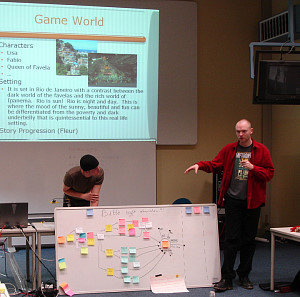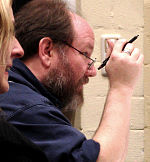I offer fun and informative workshops on various aspects of game design.
These are intensive, hands-on experiences for anyone who wants to learn about designing computer and video games. All the workshops begin with a lecture, then challenge you to apply what you've learned to flesh out a new game concept. They're suitable for anyone from undergraduates to industry professionals. Most are paper-based, no computers required! Click on the titles to learn more about each one. For the logistical requirements of the workshops,
please scroll to the bottom of the page or click here.
Fundamental Principles of Game Design
The most popular workshop. It's a day-long exploration of the basics of the craft, covering core mechanics, gameplay, user interface design, concept art, level design, and even a small story. Designed for teams of 5 or 4. | Character Design Workshop
A one-day workshop devoted specifically to character design, concentrating on creating a believable game hero and giving him or her exciting things to do in a richly-imagined world. Intended for teams of 4. | Fundamentals Mini-Workshop
A scaled-down version of the Fundamentals workshop, this lasts anywhere from a blinding-fast 90 minutes to four hours. It concentrates on designing the primary gameplay mode for a new game.
Intended for teams of 2 or 3. | User Interface Design Workshop
A one-day workshop. Each team mocks up several different gameplay modes for a hypothetical game that I give them, using PowerPoint. We discuss them afterwards.
Computers required. | Introduction to Interactive Storytelling
A one-day
introductory workshop intended for people who know something about storytelling, but aren't familiar with video games. It's ideal for people from other media, such as writers and animators. It consists of two mini-workshops back to back. For teams of 4. | Interactive Storytelling 5-Day Workshop
This is the big one. Five days of deep, serious, thought about creating interactive stories. The participants learn to design characters and integrate player actions with a plot line to create an emotionally compelling experience. Computers required. | Designing for Accessibility
This short workshop introduces participants to the essential issues of making games accessible to players with a variety of handicaps. After the introductory lecture, they are assigned a disability and a game genre at random, and design a game for that condition.(Dedicated web page under construction) | Serious Games Workshop
Using the same techniques as in the Fundamental Principles workshop, participants work to design a game with a message -- be it educational, advertising, or political. They have to decide how the mechanics and user interface of their game convey the message.
(Dedicated web page under construction) | Motion Gameplay Workshop
The Nintendo Wii was the first motion-sensing video game controller to really catch on, and it has revolutionized game design for games that involve physical activities such as sports, dancing, and martial arts. This 3-hour workshop challenges participants to design the primary gameplay mode of a new game using motion
gameplay. For teams of 2. | Casual Free-to-Play Games Workshop
* NEW! *
By letting players pay only when they want to, casual free-to-play online games make far more money than conventional subscription-based games. This short workshop teaches how these games entertain and how they
are monetized. Participants will devise a casual free-to-play game based on a given theme.
(Dedicated web page under construction.) |
|
Any workshop can be adjusted for length or content to suit the needs of the audience or sponsoring organization.

| Some of my clients:
Sony
BioWare
Crytek
Ubisoft Canada
Cornell University
Rutgers University
Dublin Institute of Technology, Ireland
Artificial Mind and Movement (A2M)
Rochester Institute of Technology
Rensselaer Polytechnic Institute
University of Gotland, Sweden
Games Academy, Berlin
Fuse 04 Conference, New Zealand
University of Art and Design, Finland
Art Futura Festival,
Barcelona
SAGAS Writing Interactive Fiction
Game Developers' Conference Read about some of the best results! | |
A Lead Designer presents his team's new game. | |
|
How the workshops operate.
 | "A great workshop! I found Ernest Adams to be a well-spoken, sympathetic and experienced lecturer. The single day with him was a great learning experience I wouldn't want to miss – and it was over all too soon. After a few hours I found myself and my teammates with an idea for a computer game we would never have thought of." — Nicolaas Bongaerts, Student, Games Academy 2003 Read more testimonials. |
|
All the workshops are team-based, to create a scaled-down version of a professional design environment. Different workshops
have different-sized teams. In most cases, the team members take on specific roles: lead designer, art director, and so on. Each person receives a worksheet designed specifically for his or her role.After the opening lecture, I organize the teams, usually by lottery. I give each one a different game idea in a sealed envelope (except in the User Interface and Interactive Storytelling workshops). Each idea is unique and is something that has never been developed
commercially. This guarantees that every team has something different to present at the end of the day. The worksheets guide the teams through the process and help them to document their thinking. Most workshops are divided into collaborative, individual, and consolidation phases. In the final phase, the teams assemble their results into an informal presentation or poster. Throughout the workshop, I visit each team in turn to see how they're doing and offer guidance. But nobody
gets too much help! My role is to discuss alternatives, not to give "right" answers. After they have finished work, each team either gives a presentation to the group, or if there are too many teams, a poster session where everyone can mingle and see what the others have done. I then wrap it up with feedback on each game and a few final thoughts. There are no pre-requisites. The only experience you need is a love of games. | 
| | I critique each team's work. |
|
Want to book a workshop in your area?
I do workshops both for companies and universities, and at public events such as the Game Developers' Conference. If you'd like me to run a workshop at your school, company, or event, send me E-mail to arrange a suitable location and time. Please get in touch early—my time can be booked up as much as six months in advance. Logistical Requirements - please read carefully!
- Computers: None required (except Interactive storytelling and User Interface Design). Everything is pencil-and-paper based.
- Minimum size: 8 participants. Because they are so collaborative, the workshops require a minimum of 8 people. However, team size can vary somewhat. The total number of participants does not have to be an exact multiple of the workshop's team size.
- Maximum size: only limited by your facilities.
However, if you want the participants to present their designs to the whole group, the maximum number of teams is 10. For larger groups, we can organize a poster session in which the team leaders present their results simultaneously. (You will have to supply the poster board.)
- Age limit: except by prior arrangement, these workshops are not suitable for persons under the age of 16.
They do not contain adult content, but the team environment requires a certain level of social maturity.
- Room requirements: The participants will need tables that they can work at in teams. Classrooms are preferred; computer labs are workable but awkward. The entire group needs to be together for the lecture at the beginning and the presentations at the end, but the teams can work
separately during the middle if necessary. For the day-long workshops, we need suitable space for 9 hours, counting setup and cleanup.
- Presentation gear: A video projector and screen are required for the opening lecture and presentations at the end. Audio support is not needed; however, in very large rooms I will need a microphone.
- Printing/copying facilities: A substantial amount of printing or photocopying will be required
before the workshop begins. This must be done on-site as I cannot bring all the necessary materials with me. I will send you the PDF files ahead of time by E-mail.
- For poster workshops (discuss with me if you need this), you will need to provide one posterboard for each team, pencils, and a large number of colored felt-tip markers. Scissors, tape, and glue sticks will also be welcome but are not essential.
- Food and beverages: Must be available nearby for day-long events.
The day-long workshops go through lunch.
- An Internet connection is helpful but not essential in most workshops.
Fees and Expenses I normally charge a flat fee to the workshop sponsor based on the workshop length, not on the number of attendees. In addition to my fee, it will be up to you to supply travel, lodging, and other expenses unless otherwise stated. Send me E-mail to work out the details.
|